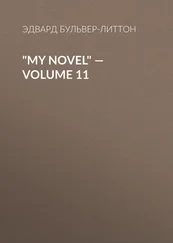Эдвард Бульвер-Литтон - My Novel — Complete
Здесь есть возможность читать онлайн «Эдвард Бульвер-Литтон - My Novel — Complete» — ознакомительный отрывок электронной книги совершенно бесплатно, а после прочтения отрывка купить полную версию. В некоторых случаях можно слушать аудио, скачать через торрент в формате fb2 и присутствует краткое содержание. Жанр: foreign_prose, literature_19, Европейская старинная литература, foreign_antique, на английском языке. Описание произведения, (предисловие) а так же отзывы посетителей доступны на портале библиотеки ЛибКат.
- Название:My Novel — Complete
- Автор:
- Жанр:
- Год:неизвестен
- ISBN:нет данных
- Рейтинг книги:5 / 5. Голосов: 1
-
Избранное:Добавить в избранное
- Отзывы:
-
Ваша оценка:
- 100
- 1
- 2
- 3
- 4
- 5
My Novel — Complete: краткое содержание, описание и аннотация
Предлагаем к чтению аннотацию, описание, краткое содержание или предисловие (зависит от того, что написал сам автор книги «My Novel — Complete»). Если вы не нашли необходимую информацию о книге — напишите в комментариях, мы постараемся отыскать её.
My Novel — Complete — читать онлайн ознакомительный отрывок
Ниже представлен текст книги, разбитый по страницам. Система сохранения места последней прочитанной страницы, позволяет с удобством читать онлайн бесплатно книгу «My Novel — Complete», без необходимости каждый раз заново искать на чём Вы остановились. Поставьте закладку, и сможете в любой момент перейти на страницу, на которой закончили чтение.
Интервал:
Закладка:
I know not how it is, but your very clever man never seems to care so much as your less gifted mortals for cleverness in his helpmate. Your scholars and poets and ministers of state are more often than not found assorted with exceedingly humdrum, good sort of women, and apparently like them all the better for their deficiencies. Just see how happily Racine lived with his wife, and what an angel he thought her, and yet she had never read his plays. Certainly Goethe never troubled the lady who called him “Mr. Privy Councillor” with whims about “monads,” and speculations on colour, nor those stiff metaphysical problems on which one breaks one’s shins in the Second Past of the “Faust.” Probably it may be that such great geniuses—knowing that, as compared with themselves, there is little difference between your clever woman and your humdrum woman—merge at once all minor distinctions, relinquish all attempts at sympathy in hard intellectual pursuits, and are quite satisfied to establish that tie which, after all, best resists wear and tear,—namely, the tough household bond between one human heart and another.
At all events, this, I suspect, was the reasoning of Dr. Riccabocca, when one morning, after a long walk with Miss Hazeldean, he muttered to himself,—
“Duro con duro
Non fete mai buon muro,”—
which may bear the paraphrase, “Bricks without mortar would make a very bad wall.” There was quite enough in Miss Jemima’s disposition to make excellent mortar: the doctor took the bricks to himself.
When his examination was concluded, our philosopher symbolically evinced the result he had arrived at by a very simple proceeding on his part, which would have puzzled you greatly if you had not paused, and meditated thereon, till you saw all that it implied. Dr. Riccabocca, took of his spectacles! He wiped them carefully, put them into their shagreen case, and locked them in his bureau,—that is to say, he left off wearing his spectacles.
You will observe that there was a wonderful depth of meaning in that critical symptom, whether it be regarded as a sign outward, positive, and explicit, or a sign metaphysical, mystical, and esoteric. For, as to the last, it denoted that the task of the spectacles was over; that, when a philosopher has made up his mind to marry, it is better henceforth to be shortsighted—nay, even somewhat purblind—than to be always scrutinizing the domestic felicity, to which he is about to resign himself, through a pair of cold, unillusory barnacles. As for the things beyond the hearth, if he cannot see without spectacles, is he not about to ally to his own defective vision a good sharp pair of eyes, never at fault where his interests are concerned? On the other hand, regarded positively, categorically, and explicitly, Dr. Roccabocca, by laying aside those spectacles, signified that he was about to commence that happy initiation of courtship when every man, be he ever so much a philosopher, wishes to look as young and as handsome as time and nature will allow. Vain task to speed the soft language of the eyes through the medium of those glassy interpreters! I remember, for my own part, that once, on a visit to the town of Adelaide, I—Pisistratus Caxton—was in great danger of falling in love,—with a young lady, too, who would have brought me a very good fortune,—when she suddenly produced from her reticule a very neat pair of No. 4, set in tortoiseshell, and fixing upon me their Gorgon gaze, froze the astonished Cupid into stone! And I hold it a great proof of the wisdom of Riccabocca, and of his vast experience in mankind, that he was not above the consideration of what your pseudo-sages would have regarded as foppish and ridiculous trifles. It argued all the better for that happiness which is our being’s end and aim that in condescending to play the lover, he put those unbecoming petrifiers under lock and key.
And certainly, now the spectacles were abandoned, it was impossible to deny that the Italian had remarkably handsome eyes. Even through the spectacles, or lifted a little above them, they were always bright and expressive; but without those adjuncts, the blaze was softer and more tempered: they had that look which the French call veloute, or velvety; and he appeared altogether ten years younger. If our Ulysses, thus rejuvenated by his Minerva, has not fully made up his mind to make a Penelope of Miss Jemima, all I can say is, that he is worse than Polyphemus, who was only an Anthropophagos,—
He preys upon the weaker sex, and is a Gynopophagite!
CHAPTER XXIII
“And you commission me, then, to speak to our dear Jemima?” said Mrs. Dale, joyfully, and without any bitterness whatever in that “dear.”
DR. RICCABOCCA.—“Nay, before speaking to Miss Hazeldean, it would surely be proper to know how far my addresses would be acceptable to the family.”
MRS. DALE.—“Ah!”
DR. RICCAROCCA.—“The squire is of course the head of the family.”
MRS. DALE (absent and distraite).—“The squire—yes, very true—quite proper.” (Then, looking up, and with naivete) “Can you believe me? I never thought of the squire. And he is such an odd man, and has so many English prejudices, that really—dear me, how vexatious that it should never once have occurred to me that Mr. Hazeldean had a voice in the matter! Indeed, the relationship is so distant, it is not like being her father; and Jemima is of age, and can do as she pleases; and—but, as you say, it is quite proper that he should be consulted as the head of the family.”
DR. RICCASOCCA.—“And you think that the Squire of Hazeldean might reject my alliance! Pshaw! that’s a grand word indeed,—I mean, that he might object very reasonably to his cousin’s marriage with a foreigner, of whom he can know nothing, except that which in all countries is disreputable, and is said in this to be criminal,—poverty.”
MRS. DALE (kindly)—“You misjudge us poor English people, and you wrong the squire, Heaven bless him! for we were poor enough when he singled out my husband from a hundred for the minister of his parish, for his neighbour and his friend. I will speak to him fearlessly—”
DR. RICCABOCCA.—“And frankly. And now I have used that word, let me go on with the confession which your kindly readiness, my fair friend, somewhat interrupted. I said that if I might presume to think my addresses would be acceptable to Miss Hazeldean and her family, I was too sensible of her amiable qualities not to—not to—”
MRS. DALE (with demure archness).—“Not to be the happiest of men,—that’s the customary English phrase, Doctor.”
RICCABOCCA (gallantly).—“There cannot be a better. But,” continued he, seriously, “I wish it first to be understood that I have—been married before!”
MRS. DALE (astonished).—“Married before!”
RICCABOCCA.—“And that I have an only child, dear to me,—inexpressibly dear. That child, a daughter, has hitherto lived abroad; circumstances now render it desirable that she should make her home with me; and I own fairly that nothing has so attached me to Miss Hazeldean, nor so induced my desire for our matrimonial connection, as my belief that she has the heart and the temper to become a kind mother to my little one.”
MRS. DALE (with feeling and warmth).—“You judge her rightly there.”
RICCABOCCA.—“Now, in pecuniary matters, as you may conjecture from my mode of life, I have nothing to offer to Miss Hazeldean correspondent with her own fortune, whatever that may be!”
MRS. DALE.—“That difficulty is obviated by settling Miss Hazeldean’s fortune on herself, which is customary in such cases.”
Dr. Riccabocca’s face lengthened. “And my child, then?” said he, feelingly. There was something in that appeal so alien from all sordid and merely personal mercenary motives, that Mrs. Dale could not have had the heart to make the very rational suggestion, “But that child is not Jemima’s, and you may have children by her.”
Читать дальшеИнтервал:
Закладка:
Похожие книги на «My Novel — Complete»
Представляем Вашему вниманию похожие книги на «My Novel — Complete» списком для выбора. Мы отобрали схожую по названию и смыслу литературу в надежде предоставить читателям больше вариантов отыскать новые, интересные, ещё непрочитанные произведения.
Обсуждение, отзывы о книге «My Novel — Complete» и просто собственные мнения читателей. Оставьте ваши комментарии, напишите, что Вы думаете о произведении, его смысле или главных героях. Укажите что конкретно понравилось, а что нет, и почему Вы так считаете.












